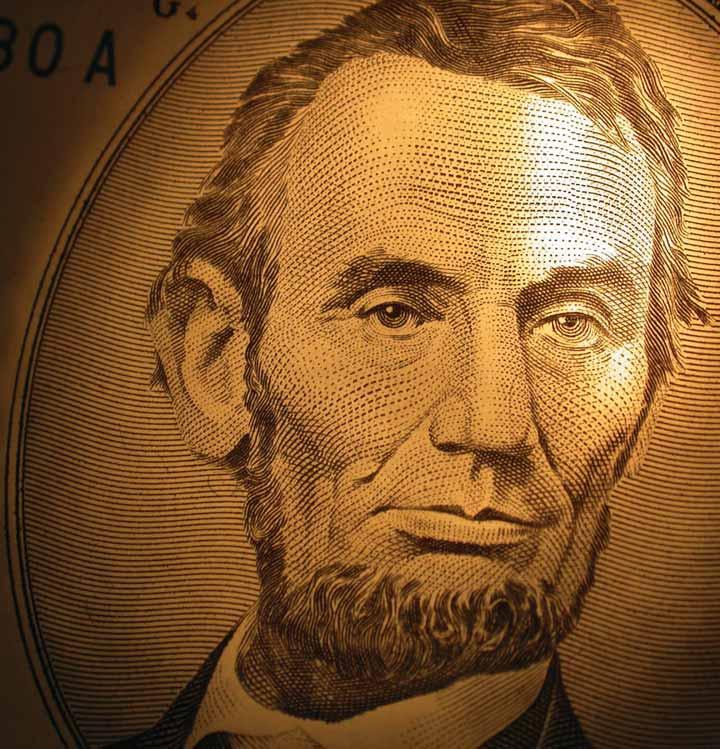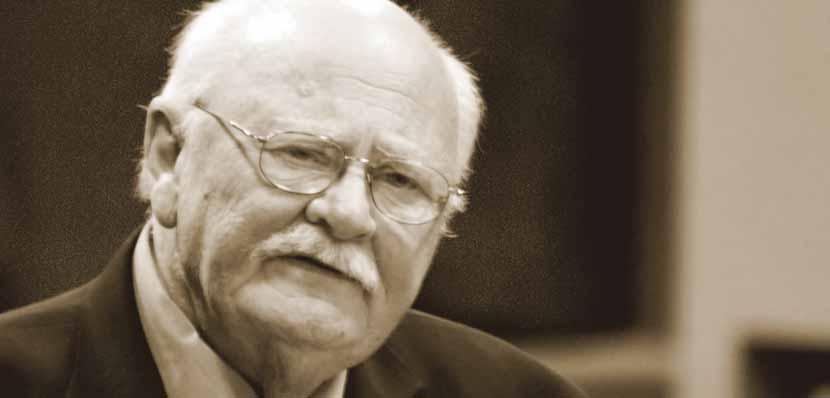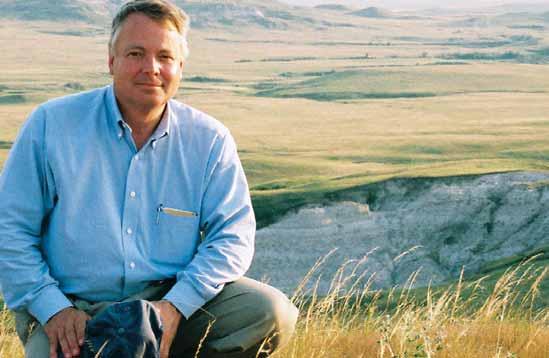
7 minute read
Abraham Lincoln on Land and Liberty

George Frein (above) presents Abraham Lincoln, sixteenth president of the United States at the Lincoln Chautauqua. Dr. Frein taught in the Philosophy and Religion Department at the University of North Dakota from 1968 to 1997. With encouragement and direction from Everett Albers, Frein was a Chautauqua scholar from 1986 to 1997, portraying Father De Smet, Henry Adams, Herman Melville, and Mark Twain. In 1998, he helped organize the National Chautauqua Tour which held Chautauquas in states outside the Great Plains.
Advertisement
By George Frein
In 1864 Congress passed and President Lincoln signed a bill into law that ceded the land around Yosemite Valley to the State of California, “upon the express conditions that the premises shall be held for public use, resort, and recreation, and shall be held inalienable for all time.” Lincoln made a brief signing statement: “A nation may be said to consist of its territory, its people, and its laws. The territory is the only part which is of certain durability. One generation passeth away, and another generation commeth, but the earth abideth forever. It is of first importance to duly consider, and estimate, this everenduring part.”
This signing statement contains the germ of the idea of National Parks in America. Lincoln brought his keen, visionary mind to a simple signing statement that was surely not his chief preoccupation that day. And yet, it was characteristic of so much of what he wrote, for it called attention to a simple fact inside a complex relationship of people and their land. His thoughts about law and liberty took up most of his time and energy, but it was the same sharp mind that addressed all topics: land, liberty, law and more. The Civil War, of course, was his chief daily concern. Lincoln did not live to write memoirs in his leisure. And yet, in the speeches he gave during the war, Lincoln created perhaps the most compelling of all Civil War narratives.
What made Lincoln’s story so compelling was his ability to bring together his uncompromising conviction that slavery was simply evil with a complex understanding of his legal obligations under the Constitution and the political

George Frein reality created by a divided and volatile public opinion. While many lesser minds complicated what was simple with tortured arguments in support of slavery, others simplified legal and political complexities with a demand for immediate abolition that was politically unrealistic. Lincoln had the strength of intellect to hold the combination of a simple moral truth and a complex legal/political reality together as he led the country through its most trying time.
Lincoln’s mind showed its greatness most brilliantly in his speeches. He was a politician and a shrewd one. He was aware of the political consequences of whatever he did. But, he only trained himself to be a politician. Deeper down in his soul, where his untrained, instinctual being was shaped, Lincoln was a thinker and writer. As a rule, he spoke only after considerable thought. He carefully wrote out his speeches and kept revising them right up to the time of delivery. The story of his drafting the Gettysburg Address on the back of an envelope at the last minute in the train going to the cemetery is not true. Like all of his major addresses it was carefully composed beforehand.
Lincoln began, long before the war, saying in utter simplicity that slavery was wrong. “A monstrous injustice,” he called it, in an 1854 speech on the Kansas-Nebraska Act. But, at once he acknowledged the complexity of American slavery: “I think I have no prejudice against the Southern people. They are just what we would be in their situation. If slavery did not exist among them they would not introduce it. If it did now exist among us, we should not instantly give it up.”
In his famous debates with Senator Stephen A. Douglas, Lincoln said his opponent “carefully excludes the thought that there is anything wrong in slavery.” Douglas talked only of “popular sovereignty”—insisting that only the people of the territory should decide whether to be slave or free. Lincoln exposed Douglas’ sophistry, by saying that Douglas’ idea was only this: “that if any one man chose to enslave another, no third shall be allowed to object.”
At the Cooper Union in New York, in the speech that immediately made him a contender for the Republican nomination, Lincoln agreed with Douglas that the founding fathers understood the question of slavery better than we do. He went on to show, however, that they not only allowed slavery, they also legislated against it in ways that Douglas’ simple understanding of American history now would forbid: they excluded it from the territories.
In his inaugural address Lincoln put the existing state of affairs simply: “One section believes slavery is right and should be extended, while the other believes it is wrong and ought not be extended.” And yet, Lincoln said: “I have no purpose to interfere with slavery in the states where it exists. I believe I have no lawful right to do so, and I have no inclination to do so.” Lincoln’s moral and constitutional convictions were held together in a complex intellectual web that neither secessionists nor abolitionists, each with narrower ideas, were equipped to appreciate.
During the war, Lincoln once received a delegation of Kentucky politicians who came to complain about recruitment of slaves as soldiers. Lincoln heard their complaints and then said: “I am naturally anti-slavery. If slavery is not wrong, nothing is wrong. I cannot remember when I did not so think, and feel. And yet I have never understood that the Presidency conferred upon me an unrestricted right to act officially upon this judgment and feeling.” And yet to save the constitution he said he was obliged to emancipate slaves and use black soldiers. Those who want to save the Union without the aid of the slaves themselves, he argued, “cannot face the truth.” Again Lincoln’s thinking was both simpler and more complex than his visitors’ view. Most famously, Lincoln’s two minute address at Gettysburg was simpler than Edward Everett’s two-hour lecture. But Lincoln was nonetheless subtly complex as he linked the nation of 1776—”conceived in
liberty”—to the nation of 1863 which needed a “new birth of freedom.”
Finally, in his Second Inaugural, Lincoln combined simple truth with complex reality most eloquently. Put simply: all knew slavery was “somehow the cause of the war,” he said. But, when he came to express himself on the ultimate meaning of the war, Lincoln’s language rose to the complex level of philosophical and theological discourse. He speculated that the war was a punishment on both North and South for the crime of slavery.
“If we shall suppose that American slavery is one of those offenses which, in the providence of God, must needs come, but which, having continued through His appointed time. He now wills to remove, and that He gives to both North and South this terrible war as the woe due to those by whom the offense came, shall we discern therein any departure from those divine attributes which the believers in a living God always ascribe to Him?”
Here in a marvelously complex sentence, Lincoln took his listeners to as lofty a place as it is imaginatively possible to go. And no one else, North or South—not minister, not professor, not any other politician—sought to put the war in as large and as meaningful a setting. In no other telling of the war were Americans offered the possibility for so profound a healing of its terrible devastation.
Only days later, after Lee’s surrender, Lincoln spoke about reconstruction to a crowd outside the White House. John Wilkes Booth was in the crowd and heard the President as he continued to write the story of the war by recommending Negro suffrage. Booth said, “That is the last speech he will ever make.” And so it was; but the land, its people, and its laws saw a new birth of liberty nonetheless.
FOR FURTHER REFLECTION:
Michael Burlingame. The Inner World of Abraham Lincoln. University of Illinois Press, 1994.
Allen C. Guelzo. Abraham Lincoln: Redeemer President. Eerdmans, 1999.
Geoffrey Perret. Lincoln’s War: The Untold Story of America’s Greatest President as Commander in Chief. Random House, 2004.
Ronald C. White. The Eloquent President: A Portrait of Lincoln Through His Words. Random House, 2005.









